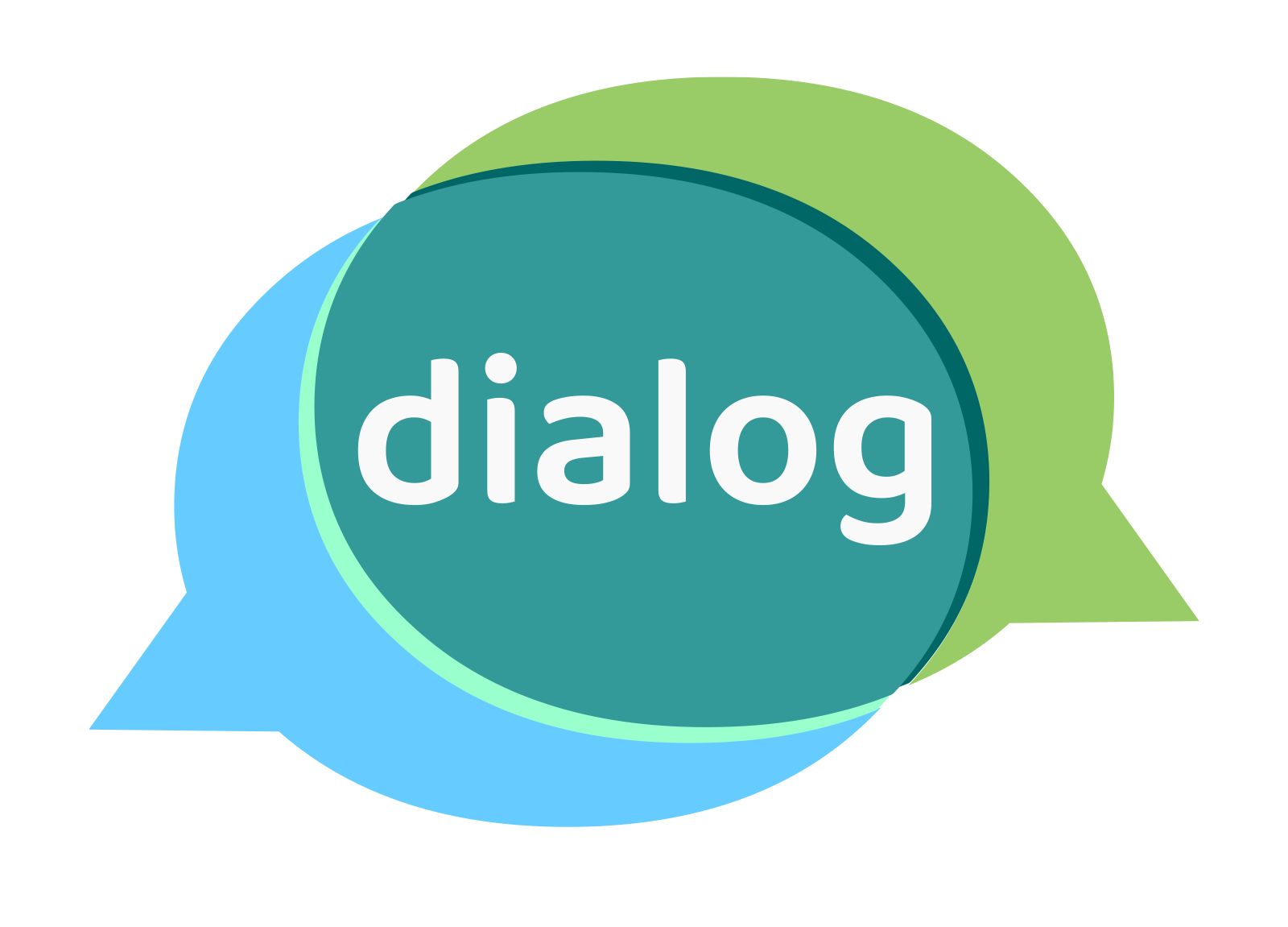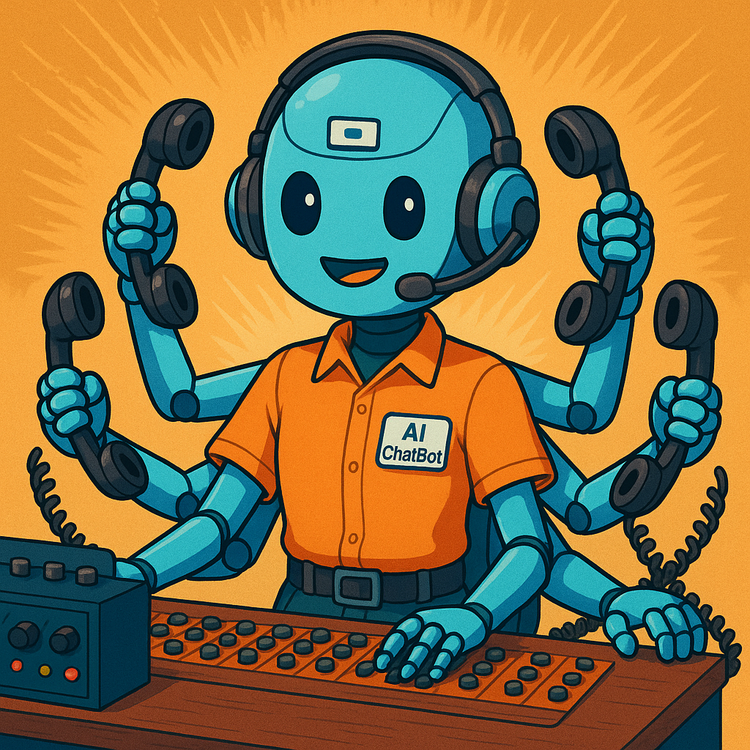SMBs Need Marketing Help, Is AI the Answer?

Despite technology advancements over the past 25 years, the general predicament of local businesses hasn't really changed. Finding and keeping customers continue to be major challenges – and perhaps always will be.
Yet technology promised to reduce friction and make these processes more efficient. And while the internet and SaaS tools have delivered in some respects, technology has itself become a big challenge for many local business operators.
New customer acquisition remains the number one challenge. And allocating time to marketing while running the business remains a struggle. Marketing expertise is also a barrier to effective execution. That's because of complexity: choosing the right channels and tools and measuring effectiveness. And complexity has increased over time.
New Customer Acquisition
Below is a comparison of data from an early 2023 survey by GoDaddy, our SMB survey and one just published by Constant Contact, conducted by Ascend2 (multi-country sample). There are differences, but at the highest level the themes are consistent.
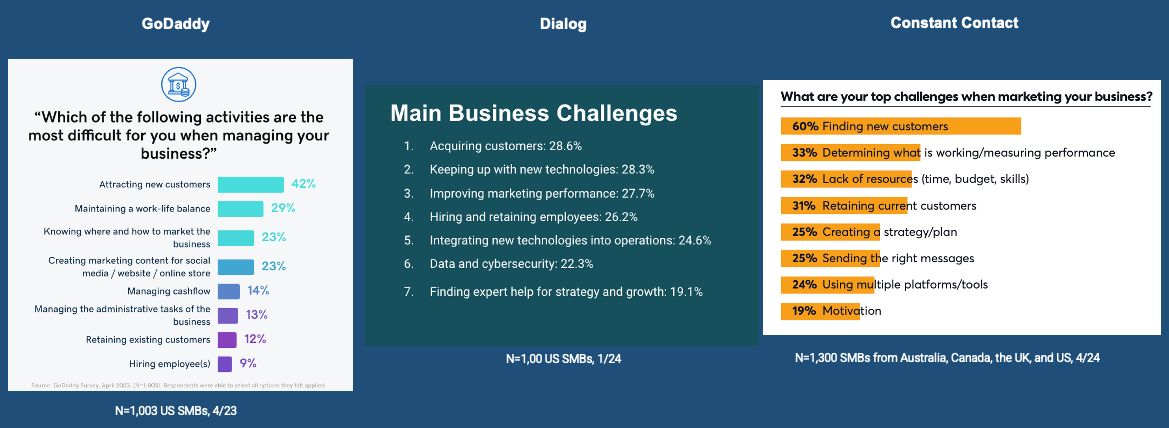
Each survey offered slightly different answer choices, but new customer acquisition was the top challenge across the board:
- Constant Contact: The email platform reported that 60% of small businesses (US, UK, Australia, Canada) identified finding customers as the top challenge. That was 27 points higher than #2.
- GoDaddy: Attracting new customers was picked by 42% of respondents in the GoDaddy survey, 13 points higher than the next response (work-life balance).
- Dialog: Our survey was tighter, with acquiring customers as the top challenge (28.6%), but with other issues very close behind.
If we segment by business size, industry or growth orientation, the responses shift somewhat. But new customer acquisition has been the persistent top challenge (and objective) of local business owners since we've been tracking this space – now more than 25 years.
Marketing Channel Challenge
All three surveys also identify marketing expertise/knowledge or "understanding what's working" as another major issue for business owners:
- Constant Contact: The second biggest business challenge is "determining what is working/measuring performance."
- GoDaddy: "Knowing where and how to market the business" and "creating marketing content" are tied as the third most difficult challenge.
- Dialog: "Keeping up with new technologies" and "improving marketing performance" are the #2 and #3 business challenges respectively.
Marketing is what generally drives customer acquisition. So where a business struggles with marketing it will necessarily struggle with acquisition by definition. A lack of time and resources, expertise and a lack of confidence are all barriers to marketing success.
According to the Constant Contact survey, only 27% of respondents expressed a high degree of confidence about the effectiveness of their marketing. Yet 82% were using multiple marketing channels, with half that number planning to increase the number of channels going forward. Thus you've got a situation where businesses are using multiple tactics and channels, without fully understanding whether they're working.
This is also something we've found in our data and in interviews with business owners. They're doing multiple things to market themselves but, in many cases, they're unclear on what's actually performing. Some local businesses pay attention to analytics while others rely on instincts or intuition.
Even very sophisticated digital marketers struggle to understand their analytics.
Easy and Cost Effective
How do businesses choose which marketing methods to use? Constant Contact found that they were using channels and tools that they already understood, were easy to implement and seen as cost-effective:
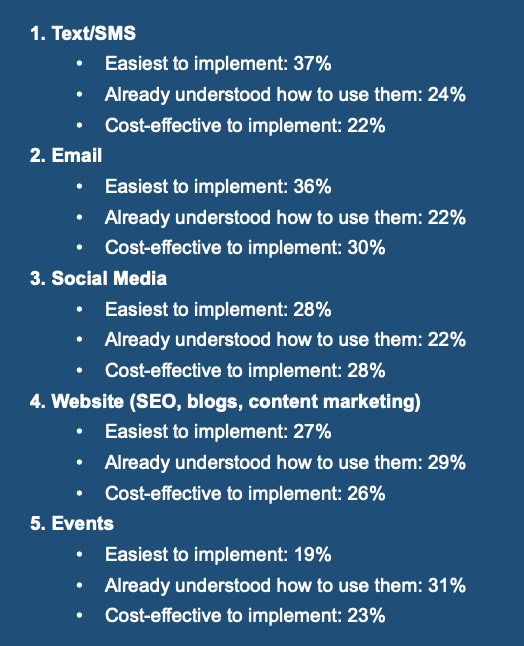
Text messaging and email were perceived as the easiest to implement, followed by social media. That was followed in turn by a cluster of things under the heading "website," including content marketing and SEO.
But when asked about which channels were used most frequently, local businesses said the following:
- Social Media: 60%
- Email: 53%
- Website (SEO, blogs, content marketing): 49%
- Text/SMS: 20%
- Events: 19%
Dialog's survey data basically tracks the Constant Contact findings, with social media #1 and email #2, as the most commonly used channels. It's clear that social media (Facebook, Instagram) and email are very familiar to most business owners, which partly accounts for their adoption and advantages vs. other channels.
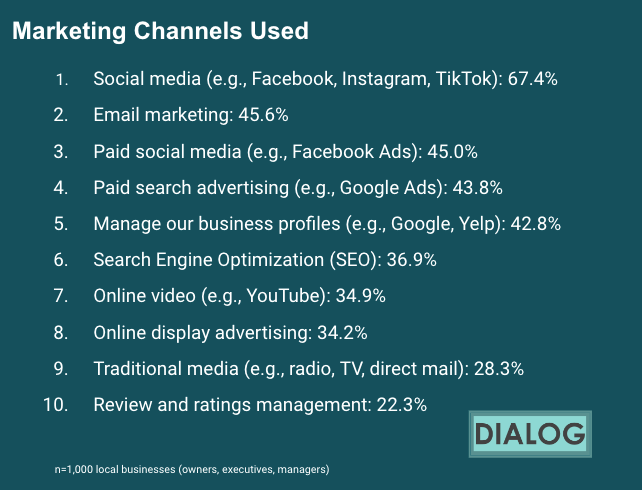
Outside Help
GoDaddy asked where local businesses wanted "outside help" to address their business challenges. Here's how they responded:
- Growing the business/increasing revenue: 22%
- Attracting new customers: 20%
- Maintaining a work-life balance: 14%
- Knowing where and how to market the business: 7%
- Creating marketing content for social media/website/online store: 6%
Constant Contact asked a similar, though more specific question: which of the following marketing activities do you need the most help with?
- Social media marketing 54%
- Email marketing 19%
- Contact management 13%
- Event management 8%
- SMS (text) marketing 6%
That list basically mirrors the Constant Contact top channels list above. In other words, business owners want help with the tools and channels they're already using, and presumably comfortable with. Yet in the Dialog survey we found that only 18% of businesses were working with an outside marketing resource.
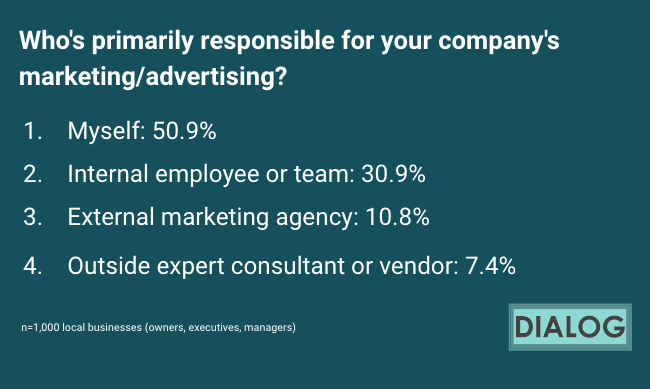
We asked the 18% why they were using an outside agency or consultant. The top answers were "not enough in-house expertise" and "not enough people in-house to execute." We also asked them what they expected from the agency/consultant:
- Strong return for our spending: 52.8%
- Help to better understand our customers: 44.4%
- Help to improve customer service: 44.4%
- Help build our brand: 42.6%
- Help to better manage and close leads: 38%
- Technology/software buying advice: 38%
- Deep understanding of our business: 35.3%
- More than just lead generation: 34.3%
- Help to better understand competition: 31.5%
- Help with business strategy: 29.6%
It's clear that local businesses need marketing strategy and tactical execution, but they also want other things like customer insights, software buying advice, strategy and competitive intelligence.
Putting all these survey findings together, it seems pretty clear that a large percentage of business owners need and want help with marketing and other operational functions, but most aren't getting it.
Budgets, Distrust and Noise
Why aren't more businesses using outside help (at least according to Dialog's data)? Often local businesses don't have the budgets; many agencies want to work with businesses that cross certain monthly spend thresholds.
Beyond budget issues, our local business interviews reveal that there's often a lack of trust or skepticism about the third parties approaching them to help with marketing. There are frequently questionable performance claims made. And there's a ton of "noise" in the market. More online resources, ratings and reviews have arguably not made it easier to find marketing help.
The takeaway is that local businesses want help but often aren't sure where to go. There's a longer discussion about what agencies and digital marketers can do to build trust with local business prospects. But we'll defer that for another time.
Where Does AI Fit In?
An intriguing question to ask is: what's AI's role in addressing these issues?
Constant Contact asked about time spent on various business management activities, including marketing. It found that 44% of businesses spent at least one hour per day on marketing, with 12% spending at least three hours per day. Yet that time may be inefficiently spent, as business owners struggle with marketing tactics, content creation and execution.
The most time consuming marketing tasks according to the Constant Contact survey are the following:
- Creating content: 51%
- Planning/creating a strategy: 40%
- Determining what is working/measuring performance: 35%
- Posting on social media: 34%
- Managing email campaigns: 19%
- Managing advertising campaigns: 19%
- Entering/integrating data: 17%
- Managing marketing for events: 14%
Many of these tasks can be accelerated with AI. The majority of businesses we surveyed were bullish on AI. Almost 90% (87.2%) have a positive perception of AI and it's potential to help their businesses, especially with marketing.
When we asked businesses what their current experience with AI was, they said:
- We're actively using it today: 31.4%
- We're testing it: 28.8%
- Undecided, still researching it: 19.5%
- We plan to start using it in 2024: 13.4%
- We're not interested/not applicable: 6.8%
AI, DIY and DIFM
OpenAI's CEO Sam Altman said that "95% of what marketers use agencies, strategists and creative professionals for today will easily, nearly instantly and at almost no cost be handled by the AI …" That's probably too aggressive but it points to the disruptive potential of AI for marketers.
The promise of AI is efficiency, simplification and cost reduction. Most digital agencies are now incorporating AI into their workflows. AI should thus help agencies (and vendors) create new and more efficient products/services and potentially reach more local businesses, which is where the market volume is.
By the same token, many businesses will figure out ways to utilize stand alone AI tools (e.g., ChatGPT) and AI layers in existing SaaS platforms to improve their output as marketers. Effective DIY is now a real possibility where it generally hasn't been in the past.
Yet the vast majority of small businesses probably won't transform into skilled digital marketers even with AI help. They will still want and need human advice and support. Therein lies the opportunity.
Local business operators are hungry for reliable information about how to improve business processes and marketing performance. And right now they're eager to learn about AI and how it can help them. SaaS providers and agencies that can step forward and become trustworthy (cost effective) resources will be rewarded.
